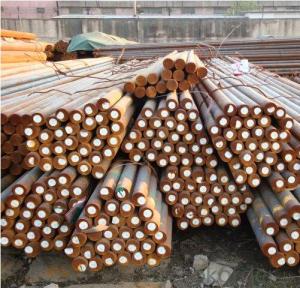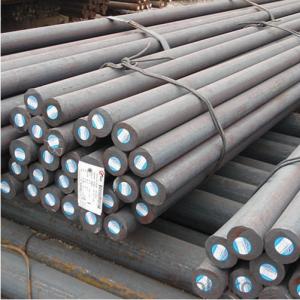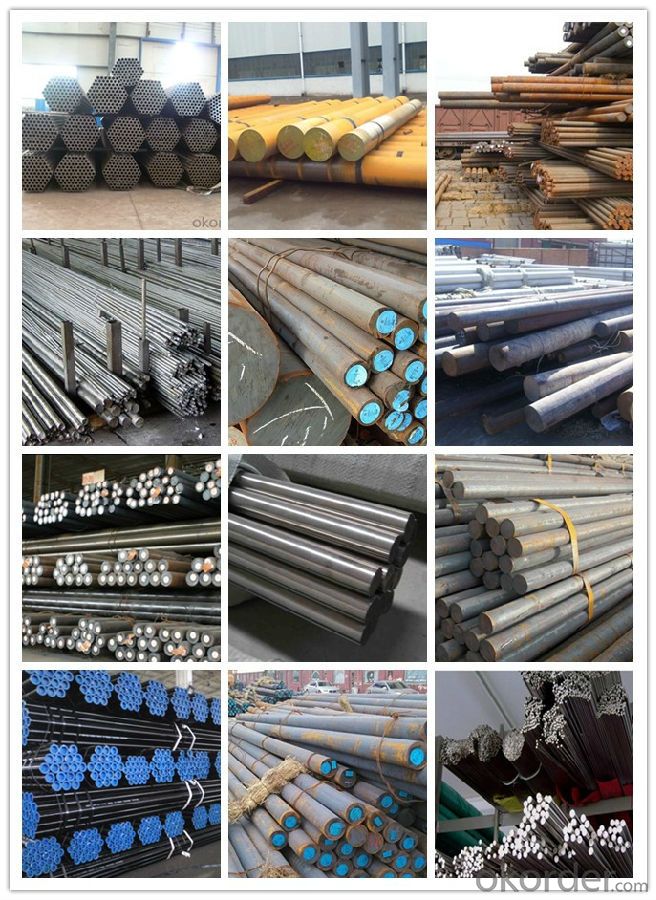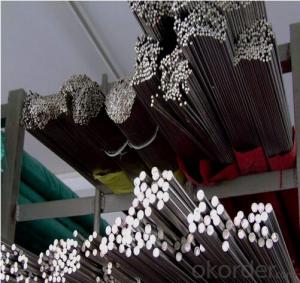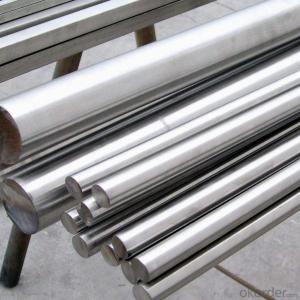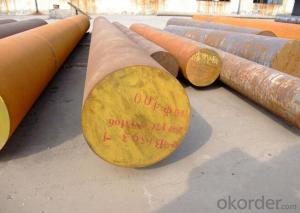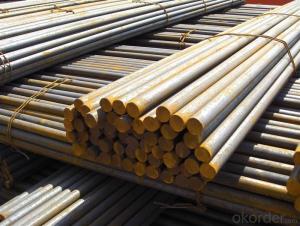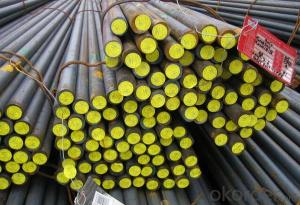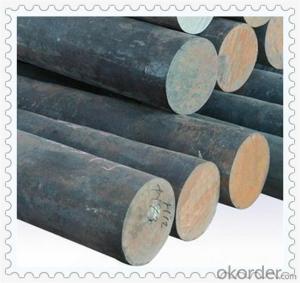Special Steel SAE8620 Alloy Structual Steel Round
- Loading Port:
- China main port
- Payment Terms:
- TT OR LC
- Min Order Qty:
- 30 m.t.
- Supply Capability:
- 10000 m.t./month
OKorder Service Pledge
OKorder Financial Service
You Might Also Like
Specification
Specifications
8620 steel round bars
1.Diameter:12~600mm
2.Delivery Conditon:annealed, black/turned surface
3.Short Delivery Time
Product information
| AISI 8620 steel flats | |||||||
| Chemical Composition(%) | |||||||
| C | Si | Mn | P | S | Cr | Mo | Ni |
| 0.38-0.43 | 0.15-0.35 | 0.60-0.80 | ≤0.030 | ≤0.030 | 0.70-0.90 | 0.20-0.30 | 1.65-2.00 |
| Heat Treatment | |||||||
| annealed, Q+T | |||||||
| Melting Process | |||||||
| 1. EAF: Electric Furnace+LF+VD(Optional) | |||||||
| 2. ESR: Electric Furnace+LF+VD+Eleroslag Remelted(Optional) | |||||||
| UT Class | |||||||
| According to Standard of SEP 1921/84,100% Volume, Level C/c, D/d or E/e | |||||||
| Tolerance on Quantity | |||||||
| +/-10% Per Size | |||||||
Product show
Workshop show
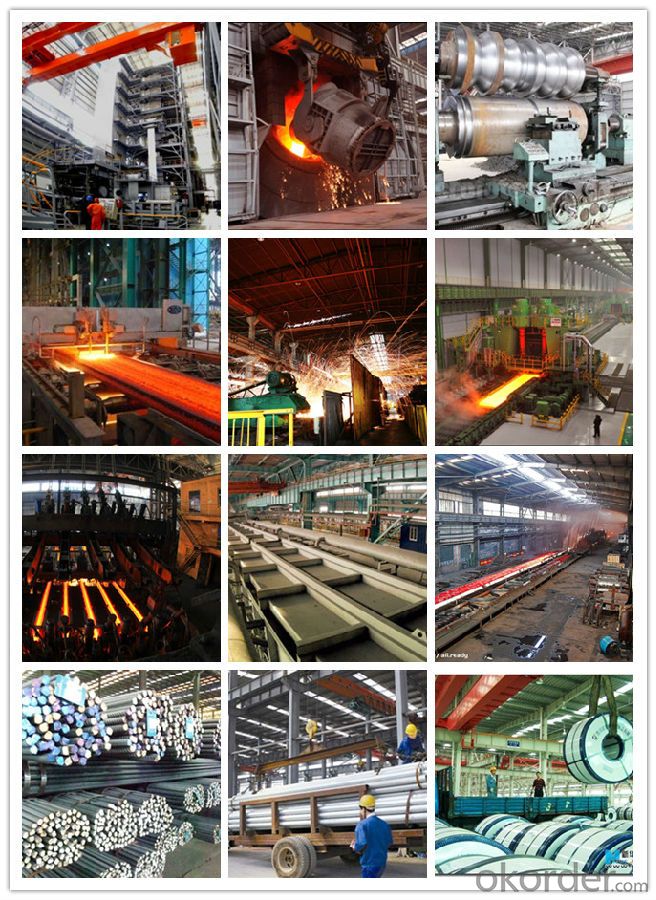
Shipping
1. FedEx/DHL/UPS/TNT for samples, Door-to-Door;
2. By Air or by Sea for batch goods, for FCL; Airport/ Port receiving;
3. Customers specifying freight forwarders or negotiable shipping methods!
Delivery Time: 3-7 days for samples; 5-25 days for batch goods.
Payment Terms
1.Payment: T/T, L/C, Western Union, MoneyGram,PayPal; 30% deposits; 70% balance before delivery.
2.MOQ: 1pcs
3.Warranty : 3 years
4.Package Informations: 1) EXPORT, In 20 feet (GW 25 ton) or 40 feet Container (GW 25 ton)
2)as customer's requirement
Why choose us?
(1) The leading exporter in China special steel industry.
(2) Large stocks for various sizes, fast delivery date.
(3) Good business relationship with China famous factories.
(4) More than 7 years steel exporting experience.
(5) Good after-sales service guarantee.
- Q: What are the different oil and gas grades of special steel?
- There are several different oil and gas grades of special steel that are commonly used in the industry. These grades are specifically designed to withstand the harsh environments and high temperatures associated with oil and gas exploration and production. Some of the most commonly used grades include: 1. API 5CT: This grade is specifically designed for use in casing and tubing applications. It has high strength and excellent resistance to corrosion, making it ideal for use in demanding oil and gas environments. 2. API 5L: This grade is used for pipeline transportation systems in the petroleum and natural gas industries. It has excellent mechanical properties and is designed to withstand high pressure and temperature conditions. 3. NACE MR0175/ISO 15156: This grade is compliant with the NACE MR0175/ISO 15156 standard, which specifies the requirements for the use of metallic materials in oil and gas production environments containing H2S (sour service). These grades have high resistance to sulfide stress cracking and hydrogen-induced cracking. 4. Duplex Stainless Steel: This grade is used in applications where high strength, corrosion resistance, and resistance to stress corrosion cracking are required. It is commonly used in offshore oil and gas production, as well as in subsea equipment. 5. Super Duplex Stainless Steel: This grade offers even higher strength and corrosion resistance than duplex stainless steel. It is commonly used in demanding oil and gas applications, such as subsea and deepwater equipment. These are just a few examples of the different oil and gas grades of special steel available in the market. The selection of the appropriate grade depends on the specific application, operating conditions, and requirements of the project. It is crucial to consult with experts or refer to industry standards and specifications to ensure the right grade is chosen for a particular oil and gas project.
- Q: What are the different forming techniques used for special steel?
- Some of the different forming techniques used for special steel include forging, casting, rolling, and extrusion.
- Q: How is special steel used in the construction supply chain?
- Special steel is used in the construction supply chain for various purposes. It is commonly used in the manufacturing of structural components, such as beams, columns, and reinforcement bars, due to its high strength and durability. Special steel is also utilized in the production of specialized tools and equipment used in construction, such as cranes, excavators, and drilling rigs. Furthermore, it plays a crucial role in the fabrication of pre-engineered buildings and modular construction systems. Overall, the use of special steel in the construction supply chain allows for the development of robust and efficient structures, enhancing the overall safety and longevity of construction projects.
- Q: Can special steel be used in the production of cutting tools?
- Yes, special steel can be used in the production of cutting tools.
- Q: Can special steel be used in the pharmaceutical manufacturing equipment manufacturing industry?
- Yes, special steel can be used in the pharmaceutical manufacturing equipment manufacturing industry. Special steel alloys such as stainless steel are commonly used due to their corrosion resistance, durability, and ability to withstand high temperatures and harsh chemicals. These qualities make special steel a suitable choice for various equipment used in pharmaceutical manufacturing, including tanks, reactors, mixers, and piping systems.
- Q: How does special steel contribute to the aerospace defense industry?
- Special steel plays a vital role in the aerospace defense industry as it offers the essential strength, durability, and resistance to extreme conditions needed for various applications in aircraft and defense systems. One of the primary contributions of special steel in this industry lies in its capacity to endure high temperatures and pressures. For instance, special steel alloys are utilized to manufacture turbine blades and other components in aircraft engines that are constantly exposed to exceedingly hot gases. These alloys possess excellent heat resistance properties, enabling them to maintain their strength and structural integrity even under such demanding circumstances. Furthermore, special steel exhibits exceptional resistance to corrosion and erosion, rendering it ideal for aerospace applications. Given that aircraft and defense systems often operate in harsh environments, including exposure to saltwater, moisture, and other corrosive elements, special steel alloys like stainless steel are employed to prevent rusting and corrosion. This ensures the longevity and dependability of critical components. Additionally, special steel is employed in the production of armor plates and ballistic protection systems for military vehicles and aircraft. Its high tensile strength and impact resistance make it an indispensable material for these applications, providing enhanced protection for military personnel and assets. Moreover, special steel finds application in the manufacturing of landing gears, wing components, and airframe structures. These components must withstand tremendous forces and stresses during takeoff, landing, and flight, making the strength and durability of special steel vital for the safety and performance of aerospace systems. In conclusion, special steel plays a crucial role in the aerospace defense industry by supplying the necessary strength, durability, and resistance to extreme conditions required for various applications. Its ability to endure high temperatures and pressures, resist corrosion and erosion, as well as its high tensile strength, make it an essential material in the manufacturing of aircraft engines, armor plates, ballistic protection systems, and other critical components.
- Q: What are the different heat treatment processes used in special steel production?
- Some of the different heat treatment processes used in special steel production include annealing, quenching, tempering, and normalizing. Annealing is a process of heating and slowly cooling the steel to relieve internal stresses and enhance its ductility. Quenching involves rapidly cooling the steel to increase its hardness and strength. Tempering is done after quenching to reduce brittleness and improve toughness. Normalizing is a heat treatment process that involves heating the steel to a specific temperature and then cooling it in still air to achieve a uniform structure. These processes are essential for achieving the desired mechanical properties and performance of special steel.
- Q: What are the environmental benefits of using special steel?
- Special steel, also known as stainless steel, offers numerous environmental benefits. Firstly, it is highly durable and long-lasting, resulting in reduced waste and resource consumption over time. Additionally, stainless steel is 100% recyclable, allowing it to be repurposed indefinitely without any loss in quality. This recycling process requires significantly less energy compared to the production of new steel, leading to a considerable reduction in carbon emissions and environmental impact. Moreover, special steel is corrosion-resistant, eliminating the need for frequent replacements and reducing the use of resources and energy associated with maintenance. Overall, the environmental benefits of using special steel include decreased waste generation, lower energy consumption, reduced carbon emissions, and increased resource efficiency.
- Q: How is special steel used in the automotive industry?
- Special steel is used in the automotive industry for various applications such as manufacturing engine components, transmission parts, suspension systems, and safety features. It provides high strength, durability, and resistance to wear and corrosion, enabling vehicles to perform better and ensuring safety standards are met.
- Q: Can special steel be used in the wastewater treatment industry?
- Yes, special steel can be used in the wastewater treatment industry. Special steel, such as stainless steel, is highly resistant to corrosion and can withstand harsh environments, making it suitable for various applications in wastewater treatment facilities. It is commonly used in the construction of tanks, pipes, valves, and other equipment used for water treatment and purification processes. Special steel's durability and resistance to chemical and biological agents make it an ideal material for ensuring the longevity and efficiency of wastewater treatment systems.
Send your message to us
Special Steel SAE8620 Alloy Structual Steel Round
- Loading Port:
- China main port
- Payment Terms:
- TT OR LC
- Min Order Qty:
- 30 m.t.
- Supply Capability:
- 10000 m.t./month
OKorder Service Pledge
OKorder Financial Service
Similar products
Hot products
Hot Searches
Related keywords
